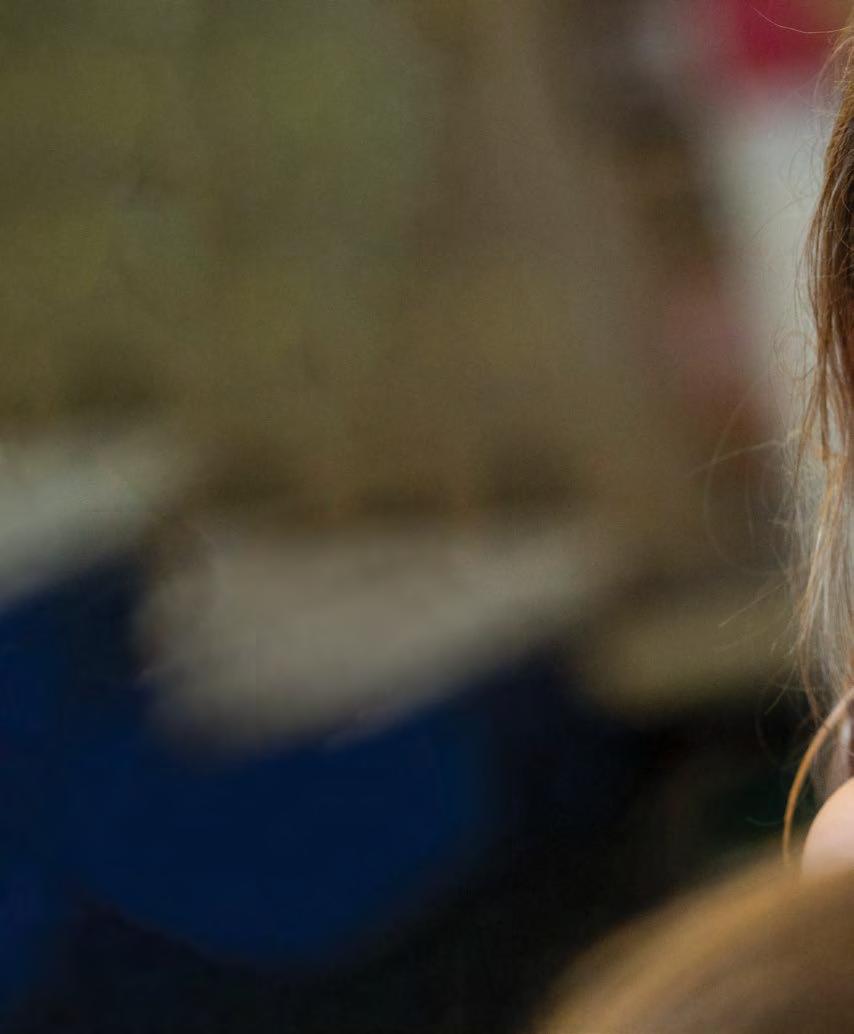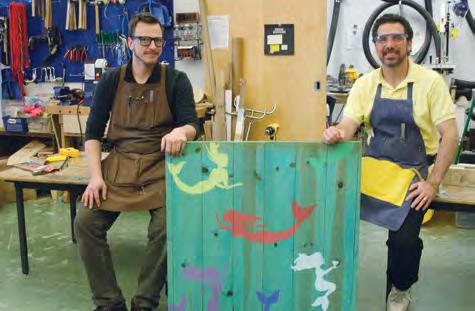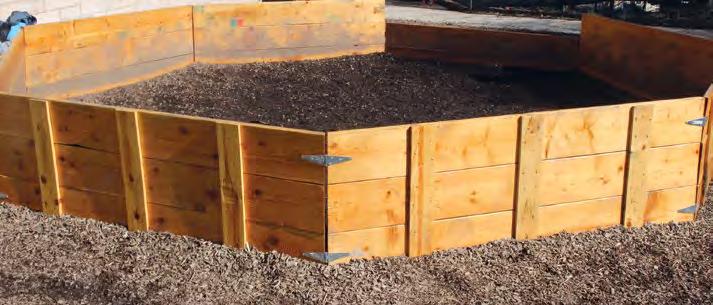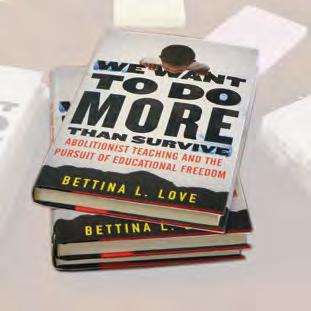
5 minute read
Feature: Wonder Lab: Tracing the Roots of Maker Education
Wonder Lab:
Tracing the Roots of Maker Education
Written by Laura Roop Photographs by Aimee Obidzinski/Pitt Visual Services and Lynnea Lombardi (as noted)
What happens when the University of Pittsburgh School of Education’s Fanny Edel Falk Laboratory School establishes a maker education space in a city at the nexus of the emerging maker movement? Falk’s Wonder Lab is offering clues for how educators can realize the full potential of maker education.


Many maker education spaces in K-12 schools focus on technology, fabrication, and hands-on tinkering in the areas of science, technology, engineering, the arts, and mathematics. Sometimes there is a designated room with materials and a 3-D printer. The
Falk School Wonder Lab has these elements, but its maker space is unusual due to the progressive nature of the school.
“At Falk School, there is an ongoing dialogue that references the deep, foundational things that make the school what it is,” says school director Jeff Suzik. “We couldn’t view making our maker education as an add-on or as an aside, where children could go in their spare time.”
“We couldn’t let the space become a tool zoo,” he adds.
Instead, the Wonder Lab is a connective hub for all K-8 students, their teachers, and the broader Falk community. Students frequently use the lab throughout the school year. Their creations connect back to other academic subjects and build a sense of community.
The Wonder Lab is part of Falk’s unique heritage. Founded in 1931, Falk School has long embraced a progressive, child-centered, constructivist approach to learning and teaching. Its influences include John Dewey’s laboratory school at the University of Chicago,
Lucy Sprague Mitchell’s Bank Street School, and Caroline Pratt’s City and Country School in New York City. Within that tradition, there is careful attention to the materials, processes, and fundamental habits of mind being taught.
As Suzik says, “Falk’s cultural drivers could be summed up by these three words: wonder, care, and act.”
Building with a Crowdfunding Campaign
The Falk Wonder Lab opened in 2016, after Falk School received a maker education grant from the Children’s Museum of Pittsburgh and $50,000 was raised from generous donors and families through a successful crowdfunding campaign. From the onset, the Wonder Lab has evoked an ethos of The Wonder Lab honors traditional arts and crafts as well as new technologye nabled making—but what everybody talks about is the ethos of empathy, caring, and connection that is sparked in the process.
A "little free library" created in memory of a student

empathy, caring, and connection through the students’ creations in the lab.
For example, to improve outdoor play for his classmates, a student envisioned building a ga-ga pit, which is a fenced-in structure used for the Israeli version of dodgeball. The ga-ga pit is a playground favorite and was autographed by students across the school.
Then there was the time that Falk teacher Chelsea Knittle needed a solution for the rabbits who were wandering in and out of her first-and second-grade classroom. Her students created a special gate to keep the bunnies enclosed when the classroom door was open. Because they knew that Knittle loved the ocean, they decorated the gate with an underwater design adorned with mermaids.
Faculty and Students as Makers
Eighth-grader Mathew Long’s experiences with the Falk Wonder Lab have evolved over time. “Early on, I made birdhouses while learning about woodworking and wood burning. In sixth grade, we sewed togas for our play, ‘Julius Caesar,’ ” he says. Last year,

— Jill Sarada, Assistant
Director of Elementary Grades
Learning
in a project with the Western Pennsylvania School for Blind Children, Long was paired with a partially sighted buddy named Joey. He learned that Joey loved light, so Long designed him an interactive puzzle with an LED panel at the bottom and puzzle pieces that matched particular colors.
This year, the projects are self-driven. Long recently began designing a Dungeons and Dragons dice box for a friend. The box has a sliding lid and dividers. It will be decorated using his wood-burning skills.
The Wonder Lab also is inspiring a do-it-yourself ethic in Falk teachers. Jill

Sarada, assistant director of elementary grades learning, taught herself to crochet scarves from YouTube. “I’m rethinking what is valuable with my own children,” she says. “We’re now getting out the paints. We’re making our own Halloween costumes. It’s a wonderful way to come together as a family.”

”It transcends making a box or sewing a pillow,” said eighth-grade student Matthew Long. The Falk Wonder Lab teaches him to solve problems, face adversity, and overcome o bstacles.“It’s a blast, learning while we are having fun,” he says.

The Value of Making with Children
Wonder Lab faculty members Timothy Wagner and Derek Werderitch make an extraordinary team. Beyond their proficiency in industrial arts, technology, and design thinking, they also draw upon the principles of applied developmental psychology as they create engaging learning activities for their students.
The key ingredient to successful maker spaces, says Werderitch, who has helped to establish a dozen maker spaces in the region, is “staff, not stuff.” 3-D printers, storebought maker strips, and robotics kits are not best practices, he says. “What is needed are responsive, interactive teachers. Students should articulate their learning goals as they create.”
The Wonder Lab is more than a dropin space; it is built into the yearly rotation for students. “Math, history, social justice, science—we touch on everything,” says Wagner. “In the very early grades, we focus on dispositions, language outcomes, tools, processes, and materials. We have bigger ideas than just teaching a skill. We want to teach the child as a whole.” In fact, Falk School is now developing a curriculum for Wonder Lab that will tie into every class and level.
Maker education is a different kind of learning that Falk students have embraced.
“It transcends making a box or sewing a pillow,” says Long, the eighth-grade student.
Long working on his Dungeons and Dragons dice box

The Falk Wonder Lab teaches him to solve problems, face adversity, and overcome obstacles. “It’s a blast, learning while we are having fun,” he says. ◆








